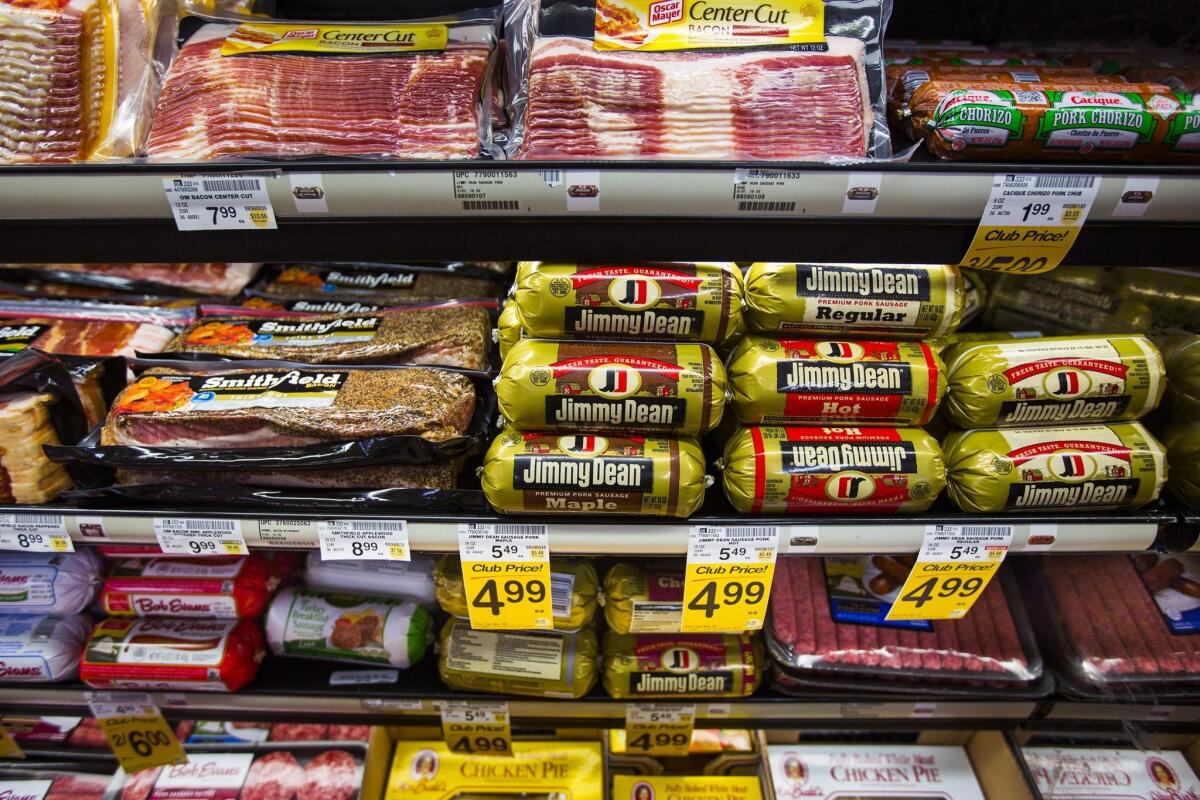Bacon and hot dogs can raise cancer risk, WHO says

Processed meats on display at a Washington, D.C., grocery store. A new report from the World Health Organization confirms that processed meats can cause cancer, and says that red meat is probably a human carcinogen as well.
The World Health Organization has confirmed some rather unwelcome dietary advice: Bacon, hot dogs and other processed meats can increase your risk of cancer. Not only that, fresh cuts of red meat probably cause cancer, too.
While doctors have long warned against eating too much meat, the WHO’s International Agency for Research on Cancer in Lyon, France, gave the most definitive response yet Monday about its relation to cancer. The report, published Monday in the journal Lancet Oncology, classifies processed meats as “carcinogenic to humans,” putting them in the same category as asbestos, tobacco smoke and formaldehyde.
A group of 22 scientists came to that conclusion after evaluating more than 800 studies from several continents about meat and cancer. They defined processed meat as those that have “been transformed through salting, curing, fermentation, smoking, or other processes to enhance flavour or improve preservation.” Although most processed meats are derived from beef and pork, they can also be made from other kinds of red meat, poultry or organ meats like liver or sweetbreads.
The IARC scientists also classified red meat as “probably carcinogenic.” That puts it in the same category as lead compounds and the insecticide malathion.
In addition to pork and beef, red meats include veal, lamb, mutton, horse and goat, the report says.
Altogether, the researchers evaluated the risk of 16 types of cancer. The strongest link was seen for colorectal cancer, which is the third most common cancer among American adults. For each 50 grams of processed meat eaten per day, the risk of colorectal cancer grew by 18%. In addition, for each 100 grams of red meat eaten per day, the risk of colorectal cancer rose by 17%, according to the Lancet Oncology report.
Among other types of cancer, the researchers found positive associations between processed meat consumption and stomach cancer. They also noted links between red meat consumption and cancers of the prostate and pancreas.
The American Institute for Cancer Research strongly endorsed the new report. Susan Higginbotham, the group’s vice president for research, said she hoped it would finally encourage people limit their consumption of red meat to no more than 18 ounces per week and to stop eating processed meat altogether.
Susan Gapstur, vice president of epidemiology for the American Cancer Society, said the public may be surprised to learn that their deli meats and lamb chops can cause cancer. But the medical evidence is clear. In fact, the American Cancer Society has warned of the dangers of eating too much red meat and processed meat since 2002.
“Classifying processed meat as carcinogenic and red meat as probably carcinogenic to humans is not unexpected,” Gapstur said in a statement.
Meat industry groups pushed back on those classifications. The North American Meat Institute argued in a statement that “cancer is a complex disease not caused by single foods” and stressed the importance of lifestyle and environmental factors.
The WHO report noted that red meat contains important nutrients but said it was associated with some cancers in several studies. Grilling, pan-frying or other high-temperature methods of cooking red meat produce the highest amounts of chemicals suspected to cause cancer.
In labeling processed meat a “Group 1” carcinogen, the researchers did not say that sausages were as dangerous as cigarettes – only that the evidence showing that they increased one’s risk of cancer was equally strong.
The American Institute for Cancer Research noted that compared to nonsmokers, people who smoke may be as much as 20 times more likely to get cancer. However, compared to people who don’t eat meat, those who do are roughly twice as likely to be diagnosed with cancer.
Associated Press was used in compiling this report.
MORE FROM SCIENCE
First-time tobacco users lured by flavorings, report says
Take a virtual tour of Gale Crater, an ancient Martian land of lakes
NASA and the U.S. Forest Service team up to design better fire shelters
Follow me on Twitter @LATkarenkaplan and “like” Los Angeles Times Science & Health on Facebook.







